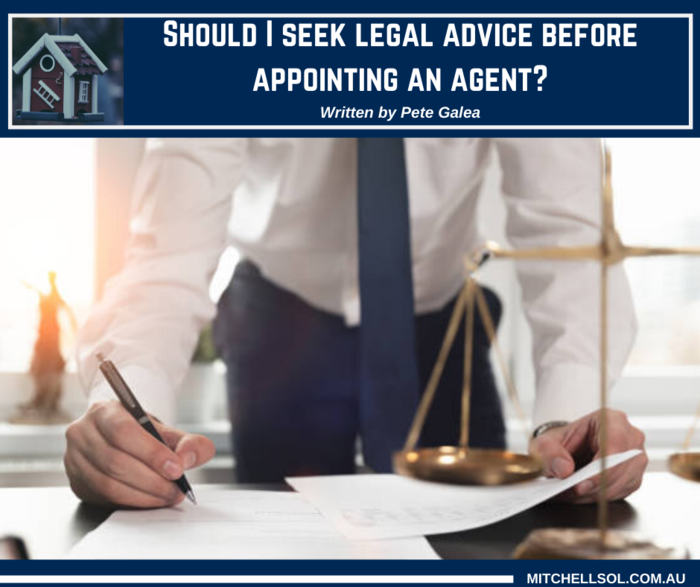Should I seek legal advice before appointing an agent?
Written by Pete Galea
The Smiths – the first real estate problem
Mr & Mrs Smith are homeowners that are looking to sell. The Smiths sign, what they believe to be, a standard form to appoint John Taylor (not a real person) as their real estate agent. On the form the box is ticked that it is an exclusive agency commencing immediately.
Prior to the real estate agent going live on any marketing the Smiths have some old family friends, the Jones, over for a meal and let them know they are selling their home. The Jones make a verbal offer to buy the home over dessert and it is agreed the Jones will get their solicitor to do up a contract for everyone to sign.
Several weeks pass and the agent’s marketing for the sale of the Smiths’ home is in full flight. Then, out of the blue, the Smiths receive the promised written contract from the solicitor for Mr & Mrs Jones. They sign the contract and send a short email to the agent to down tools as they have sold the home to family friends.
The agent acknowledges the email but doesn’t say much more. The day of settlement arrives and everything goes through smoothly -that is, until they receive an email from the agent enclosing an invoice for the full commission on the sale of the home.
The Smiths see their solicitor, who explains they are indeed liable for the commission because, even though they were the effective cause of the sale, by ticking the box “exclusive agency” they agreed to pay the real estate agent a commission in such circumstances. Their solicitor explains to them that if they had ticked the box “sole agency” the agent would not be legally entitled to the commission.
The Smiths – a lesson learned – or not
The years fly by and the Smiths decide they wish to once again sell their home and buy an interest in a retirement village. They seek out a different agent this time and, having learnt from their previous mistake tick the box “sole agency”.
A short time passes and a contract is formed, which is cash unconditional with a thirty day settlement period. The day before settlement the Smiths’ solicitor calls them to let them know there is problem, the buyer has decided he won’t be proceeding to settlement as he has changed his mind because he doesn’t have enough funds and has tried fruitlessly to borrow money. The Smiths tender at settlement and, as anticipated, the buyer does not show. Understandably, the Smiths instruct their solicitor to terminate the contract and, amongst other things, make a claim on the deposit. Like a bad dream, once again, the Smiths receive a short email from their agent with an invoice for the commission.
Yet again the Smiths see their solicitor and discover they have not only lost the sale but are liable for the commission. Their solicitor explains to them that though the Form 6 appointing an agent is a standard form, the terms and conditions that an agent attaches to the form are not.
What could possibly go wrong?
The above are made up names, but they are not made up stories. As mentioned, the Form 6 may be a standard document, but the terms and conditions that are attached to it by agents are not and of course can be amended.
We recommend to our clients to seek our advice prior to appointing a real estate agent for the sale of property. We not only ensure the form is completed correctly but is amended to avoid the above odd outcomes (and a number of others). Not only that, when our client is an executor, we believe it is doubly more important that the agent’s appointment is reviewed and amended accordingly.
As that mischievous saying goes:
What could possibly go wrong?
Well, in our experience, “everything”. It’s always best to seek advice sooner rather than later.

Pete Galea holds a Bachelor of Laws and a Bachelor of Psychological Science from Griffith University and in 2020 he commenced specialist postgraduate studies in Wills & Estates at the College of Law in its Master of Applied Law (Wills and Estates) programme.

